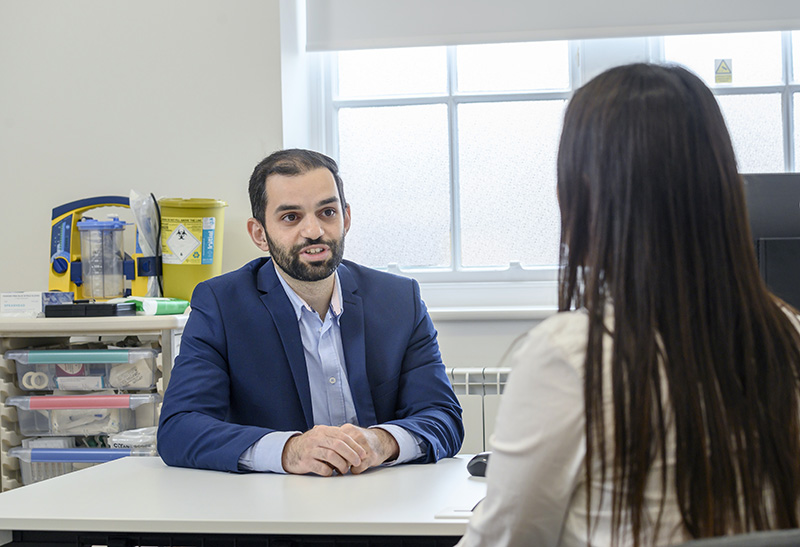Contents
Heart Palpitations

Heart palpitations can feel like a racing, fluttering, or pounding sensation in your chest. While often harmless, frequent or severe palpitations may indicate an underlying heart condition.
What Are Heart Palpitations?
Heart palpitations are irregular, fast, or forceful heartbeats that can be felt in the chest, throat, or neck. They may occur occasionally or frequently and last for a few seconds to minutes.
Palpitations can feel like:
- A racing heartbeat (tachycardia)
- A slow heartbeat (bradycardia)
- Skipped or extra beats
- A fluttering or pounding sensation
While palpitations are often harmless, they can sometimes signal a serious heart condition that requires medical attention.
Common Symptoms Associated with Palpitations
- Fast or Irregular Heartbeat – Feeling like your heart is skipping beats
- Dizziness or Lightheadedness – Could indicate reduced blood flow to the brain
- Shortness of Breath – May suggest a heart or lung condition
- Chest Pain or Discomfort – Can be a sign of a heart problem
- Fainting or Weakness – Requires urgent medical evaluation
If palpitations occur with chest pain, fainting, or severe dizziness, seek emergency medical help immediately.
Potential Causes of Heart Palpitations
Non-Serious Causes (Lifestyle & Emotional Triggers)
- Stress & Anxiety – Adrenaline release can speed up the heart rate
- Caffeine or Alcohol – Stimulants may trigger palpitations
- Intense Exercise – Physical activity can temporarily increase heart rate
- Dehydration or Electrolyte Imbalance – Affects heart rhythm
- Fever or Illness – Body temperature changes may impact the heartbeat
Medical Causes (Heart & Health Conditions)
- Arrhythmias (Irregular Heartbeat) – Electrical issues causing abnormal heart rhythms
- Coronary Artery Disease (CAD) – Narrowed arteries restricting blood flow
- Valvular Heart Disease – Faulty heart valves affecting circulation
- Hyperthyroidism (Overactive Thyroid) – Hormonal imbalance impacting heart rate
- Low Blood Sugar (Hypoglycemia) – Can trigger palpitations and dizziness
- Anemia (Low Red Blood Cell Count) – Reduces oxygen supply, making the heart work harder
- Medications & Stimulants – Certain drugs, including asthma inhalers and decongestants, may cause palpitations
How Are Palpitations Diagnosed?
At Royal Buckinghamshire Hospital, our cardiology team uses cutting-edge tests to determine the cause of palpitations, including:
- Electrocardiogram (ECG/EKG) – Measures heart rhythm and detects abnormalities
- Holter Monitor (24-48 Hour ECG) – Monitors heartbeat activity over time
- Echocardiogram (Heart Ultrasound) – Examines heart function and structure
- Stress Test (Exercise ECG) – Assesses how the heart responds to physical exertion
- Blood Tests (Thyroid, Electrolytes, & Anemia Check) – Identifies medical causes
- Event Monitor (Long-Term Heart Monitoring) – Captures intermittent palpitations
Early diagnosis is essential to rule out serious heart conditions.
Treatment Options for Heart Palpitations
Lifestyle Adjustments & Home Remedies
- Reduce Stress & Anxiety – Meditation, deep breathing, and relaxation techniques
- Limit Caffeine & Alcohol – Avoid stimulants that can trigger palpitations
- Stay Hydrated & Maintain Electrolyte Balance – Proper hydration supports heart function
- Regular Exercise – Improves cardiovascular health but should be done under medical advice
Medical Treatments & Procedures
- Beta-Blockers & Calcium Channel Blockers – Helps control heart rate
- Anti-Arrhythmic Medications – Treats irregular heart rhythms
- Ablation Therapy – For severe arrhythmias that do not respond to medication
- Pacemaker or Implantable Cardioverter Defibrillator (ICD) – For serious heart rhythm disorders
- Treating Underlying Conditions – Addressing thyroid problems, anemia, or heart disease
When to Seek Medical Help for Palpitations?
Seek urgent medical care if palpitations are accompanied by:
- Severe chest pain or tightness – May indicate a heart attack
- Fainting or Near-Fainting Episodes – Could signal a serious heart problem
- Shortness of breath or difficulty breathing – Needs immediate evaluation
- Palpitations lasting longer than a few minutes – Especially if recurring frequently
- Dizziness or Confusion – A sign of reduced blood flow to the brain
Arranging To Visit A Private GP

At Royal Buckinghamshire Hospital, we provide fast diagnosis, expert treatment, and ongoing care to support recovery and reduce future risk. Make an appointment with one of our private GPs who can refer you to our specialist cardiologist. Appointments are available to everyone and can often be booked for the same day. There is no need to be registered with our The Royal Buckinghamshire Hospital, or live locally.
If you have insurance which covers a GP visit, we can in most cases invoice the insurer directly. Where you are paying directly, the cost for a 30 minute consultation is £100.
Any additional costs will always be discussed. They could apply if you are referred for an MRI scan, or to a consultant, or for other agreed decisions to support your health.
Our Resident Private GP
Dr Chamali is welcoming and highly experienced. He offers his patients sound diagnosis and treatment, along with individual care focused on their future health.
31 March 2025




